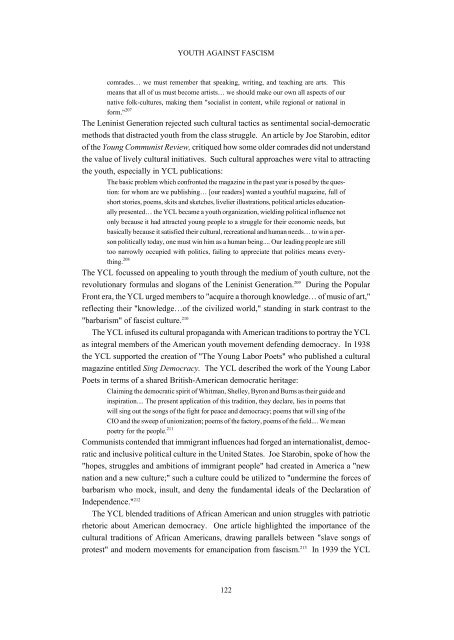Joel A Lewis Youth Against Fascism.pdf
Joel A Lewis Youth Against Fascism.pdf
Joel A Lewis Youth Against Fascism.pdf
Create successful ePaper yourself
Turn your PDF publications into a flip-book with our unique Google optimized e-Paper software.
YOUTH AGAINST FASCISM<br />
comrades… we must remember that speaking, writing, and teaching are arts. This<br />
means that all of us must become artists… we should make our own all aspects of our<br />
native folk-cultures, making them "socialist in content, while regional or national in<br />
form." 207<br />
The Leninist Generation rejected such cultural tactics as sentimental social-democratic<br />
methods that distracted youth from the class struggle. An article by Joe Starobin, editor<br />
of the Young Communist Review, critiqued how some older comrades did not understand<br />
the value of lively cultural initiatives. Such cultural approaches were vital to attracting<br />
the youth, especially in YCL publications:<br />
The basic problem which confronted the magazine in the past year is posed by the question:<br />
for whom are we publishing… [our readers] wanted a youthful magazine, full of<br />
short stories, poems, skits and sketches, livelier illustrations, political articles educationally<br />
presented… the YCL became a youth organization, wielding political influence not<br />
only because it had attracted young people to a struggle for their economic needs, but<br />
basically because it satisfied their cultural, recreational and human needs… to win a person<br />
politically today, one must win him as a human being.... Our leading people are still<br />
too narrowly occupied with politics, failing to appreciate that politics means everything.<br />
208<br />
The YCL focussed on appealing to youth through the medium of youth culture, not the<br />
revolutionary formulas and slogans of the Leninist Generation. 209 During the Popular<br />
Front era, the YCL urged members to "acquire a thorough knowledge… of music of art,"<br />
reflecting their "knowledge…of the civilized world," standing in stark contrast to the<br />
"barbarism" of fascist culture. 210<br />
The YCL infused its cultural propaganda with American traditions to portray the YCL<br />
as integral members of the American youth movement defending democracy. In 1938<br />
the YCL supported the creation of "The Young Labor Poets" who published a cultural<br />
magazine entitled Sing Democracy. The YCL described the work of the Young Labor<br />
Poets in terms of a shared British-American democratic heritage:<br />
Claiming the democratic spirit of Whitman, Shelley, Byron and Burns as their guide and<br />
inspiration.... The present application of this tradition, they declare, lies in poems that<br />
will sing out the songs of the fight for peace and democracy; poems that will sing of the<br />
CIO and the sweep of unionization; poems of the factory, poems of the field.... We mean<br />
poetry for the people. 211<br />
Communists contended that immigrant influences had forged an internationalist, democratic<br />
and inclusive political culture in the United States. Joe Starobin, spoke of how the<br />
"hopes, struggles and ambitions of immigrant people" had created in America a "new<br />
nation and a new culture;" such a culture could be utilized to "undermine the forces of<br />
barbarism who mock, insult, and deny the fundamental ideals of the Declaration of<br />
Independence." 212<br />
The YCL blended traditions of African American and union struggles with patriotic<br />
rhetoric about American democracy. One article highlighted the importance of the<br />
cultural traditions of African Americans, drawing parallels between "slave songs of<br />
protest" and modern movements for emancipation from fascism. 213 In 1939 the YCL<br />
122

















